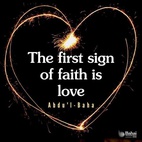The views expressed in our content reflect individual perspectives and do not represent the authoritative views of the Baha'i Faith.
The other famous biblical ark – the Ark of the Covenant – appears in the book of Exodus. Moses directed his followers to build this ark, following the guidance given to him by God.
This ark held the original stone tablets with the Ten Commandments written on them, which the Bible recounts God giving to Moses on Mount Sinai. A wooden chest with an elaborate golden lid, it had handles for carrying it long distances. Although this ark has a long and complicated history, the Israelites originally carried it in the vanguard during their 40 years of exile and wandering in the desert, regarding it as a priceless source of protection and inspiration from God for generations.
RELATED: Noah’s Ark and the Value of Spiritual Symbolism
Of course, we cannot know how much of the saga of the Ark of the Covenant is literally true. However, the ark as a metaphor does conform to the concept of progressive revelation as taught in the Baha’i Faith. So who carries the Ark of the Covenant today?
As explained in the Bible, God made a covenant with the people of Israel through His prophet and messenger, Moses. He promised that good will come to them and their children for generations if they obeyed Him and His laws; but He also warned of despair, punishment, and dispersion if they were to disobey His commandments – which were more expansive than what was revealed to either Adam or Noah. The ark represented this covenant that God had with the Israelites, and became the most sacred relic of the Jewish Faith.

This larger covenant between the Creator and humanity, which the Baha’i teachings refer to repeatedly, recurs in every new religious dispensation, and is renewed by each new messenger.
In his book Some Answered Questions, Abdu’l-Baha described how the Jewish people rose to great heights, as a result of their obedience to the laws of Moses and their faith in the covenant as symbolized by the ark:
That people had sunk to the depths of degradation and were lifted up to the heights of glory. They were captives and were set free. They were the most ignorant of peoples and became the most learned. By virtue of that which He (Moses) established, they so progressed as to be singled out among all nations, and their fame spread to every land, to such a degree that when the inhabitants of neighboring lands wanted to praise someone they would say, “Surely he must be an Israelite!” Moses established laws and ordinances that conferred new life upon the people of Israel and led them to attain the highest degree of civilization at that time.
In the Baha’i writings, the symbol of the ark also appears numerous times as an image that conveys a sense of safety, guidance, protection and salvation by calling for adherence to Baha’i precepts and spiritual principles. Here are just three of many examples:
Abdu’l-Baha, encouraging the Baha’is to study some well-known writings of Baha’u’llah, wrote:
Direct thine attention to the holy Tablets … Then wilt thou see that today these heavenly Teachings are the remedy for a sick and suffering world, and a healing balm for the sores on the body of mankind. They are the spirit of life, the ark of salvation, the magnet to draw down eternal glory, the dynamic power to motivate the inner self of man.
RELATED: The Critical Distinction Between Christ and the Creator
On another theme, Baha’u’llah also employed the image of an ark, calling his followers “the companions of the Crimson Ark:”
We have admonished Our loved ones to fear God, a fear which is the fountain-head of all goodly deeds and virtues. It is the commander of the hosts of justice … Happy the man that hath entered the shadow of its luminous standard and laid fast hold thereon. He, verily, is of the Companions of the Crimson Ark …
Ark symbolism also appears in this prayer from Baha’u’llah:
I magnify Thy Name, O my God, and offer thanksgiving unto Thee, O my Desire, inasmuch as Thou hast enabled me to clearly perceive Thy straight Path, hast unveiled Thy Great Announcement before mine eyes and hast aided me to set my face towards the Dayspring of Thy Revelation and the Fountainhead of Thy Cause, whilst Thy servants and Thy people turned away from Thee. I entreat Thee, O Lord of the Kingdom of eternity, by the shrill voice of the Pen of Glory, and by the Burning Fire which calleth aloud from the verdant Tree, and by the Ark which Thou hast specially chosen for the people of Baha, to grant that I may remain steadfast in my love for Thee, be well pleased with whatsoever Thou hast prescribed for me in Thy Book and may stand firm in Thy service and in the service of Thy loved ones …
In the Baha’i teachings the symbol of the ark serves as an effective metaphor for the safety and protection for the followers of the chosen messengers of God in time of spiritual upheaval – just like the upheaval the world is going through these days.
















Comments
Sign in or create an account
Continue with Googleor